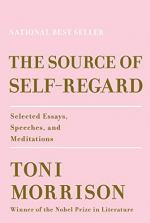
|
| Name: _________________________ | Period: ___________________ |
This quiz consists of 5 multiple choice and 5 short answer questions through Section 7: Part II--God’s Language, including the essays “The Trouble with Paradise” through “Faulkner and Woman”.
Multiple Choice Questions
1. In "The Nobel Lecture in Literature," What does Morrison refer to with the phrase "tongue-suicide"?
(a) Lying.
(b) The willingness to ban and destroy books.
(c) The death of language.
(d) A refusal to speak for what is right.
2. In "God's Language," what does Morrison say seems more true the longer she writes?
(a) That it will be possible to merge the scientific and the artistic.
(b) The impossibility of writing.
(c) The centrality of African American subjects.
(d) That she deserves the praise she got earlier in her career.
3. In "Unspeakable Things Unspoken," Morrison credits what group with beginning to open up the canon?
(a) Immigrants.
(b) The American academy.
(c) Black writers.
(d) Feminist scholars.
4. In "Literature and Public Life," Morrison says that we live in the age of what?
(a) Resignation.
(b) Spectacle.
(c) Inquiry.
(d) Conscience.
5. In "Tribute to Martin Luther King Jr.," what does Morrison say is MLK's legacy?
(a) He taught the world that religious faith must translate into social action.
(b) He provided the motivation for both Black and white Americans to tear down racial barriers.
(c) He inspired young people to become civil rights leaders.
(d) He made it a compelling and ordinary act to take personal responsibility for preventing social harm.
Short Answer Questions
1. The art show Morrison discusses in "Harlem on My Mind" had a catalog with a forward written by whom?
2. What does the title "Academic Whispers" refer to?
3. In "Chinua Achebe," what does Morrison say she discovered at Africa House?
4. Which is the best definition of "churlish" as used in "Unspeakable Things Unspoken"?
5. The Radiance of the King is a novel by Camara Laye, an author of what origin?
|
This section contains 353 words (approx. 2 pages at 300 words per page) |

|




